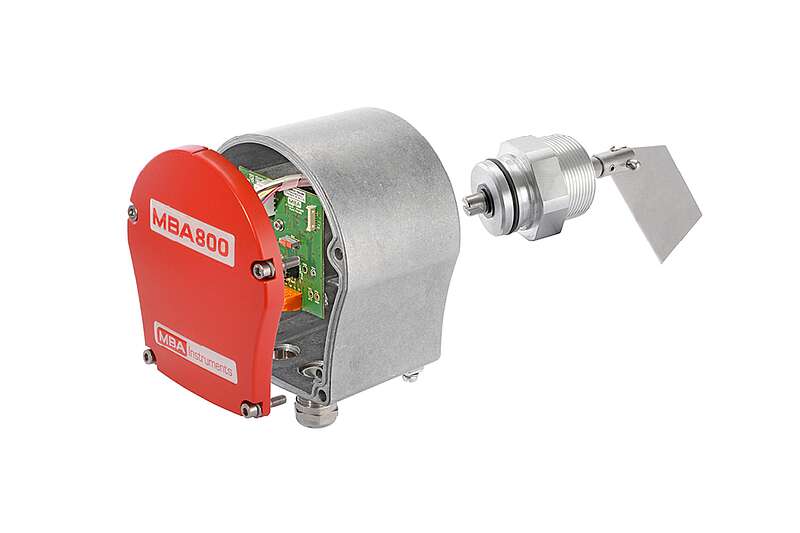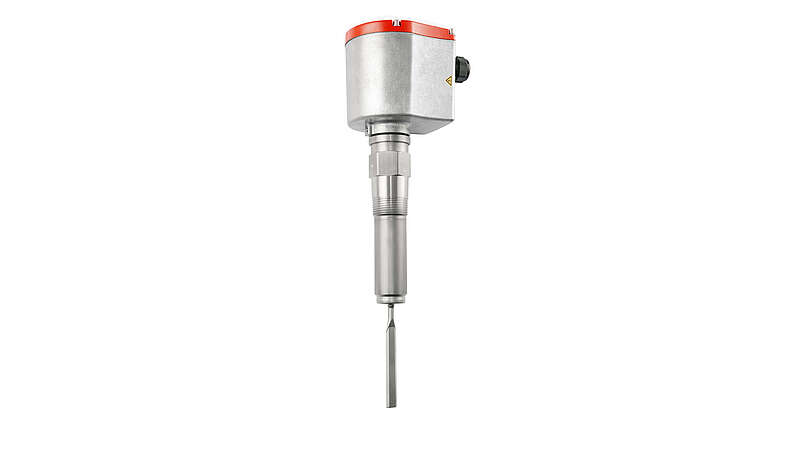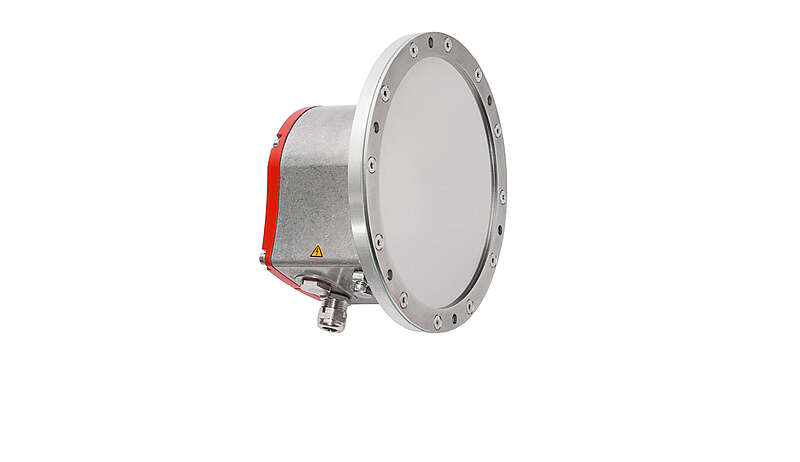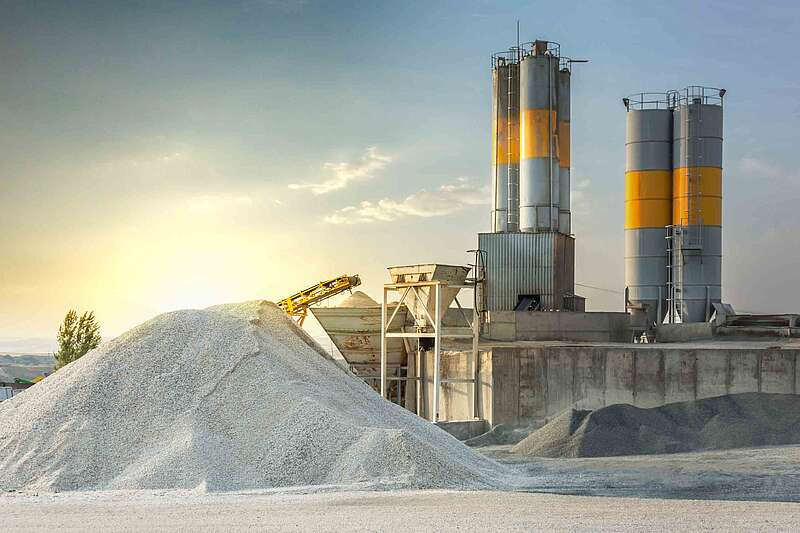Precise cement dosing thanks to MBA level measurement
Cement acts as an "adhesive" in concrete and has a significant influence on its properties. The building material is omnipresent in our society and we can no longer imagine life without it. The bulk solids are stored in cement silos.
Precise and stable dosing of cement is a prerequisite for profitable concrete production and the associated quality concrete. To ensure this, reliable level measurement is required. The challenge for the correct measurement of cement is to find a system that measures reliably even in a dusty environment.
Our measurement technology not only enables accurate dosing, but also offers the possibility of real-time monitoring of the fill level in cement silos. This enables early detection of deviations.
Level control in cement production processes
To ensure that the continuous filling process of the bulk solids is not jeopardised, sufficient cement must always be available, which is why the exact quantities of cement must be known.
Point level measurement is required for economical stockpiling. MBA Instruments offers a customised product selection for the inventory control of solids for your individual application. Our measuring devices are insensitive to deposits. This innovative technology ensures reliable performance over time.
Precise level measurement of cement in silos is essential for an efficient production chain. Whether in the building materials industry or other industries, MBA level measurement offers a reliable solution to optimise storage and seamlessly control production processes.
Our technology stands for innovation, reliability and customised solutions - everything to promote your success.
The challenges of cement as a material
The requirements for level measurement in cement silos are undoubtedly demanding and require specially developed measurement technology that can withstand these conditions. Our measurement technology from MBA Instruments has been tailored precisely to such challenges and offers solutions for these special requirements:
By taking all these factors into account, our measurement technology ensures reliable and accurate level measurement in demanding environments such as cement silos. It enables precise dosing and real-time monitoring, regardless of the external conditions, and helps to make concrete production more efficient and of higher quality.
When stored in silos, the cement powder is very compact and, with a density of 1.44 tonnes/m3 , it must be considered a heavy bulk solids. The surface of the cement particles is very sharp-edged and has an abrasive effect. This has consequences for all components used in cement production. When selecting suitable level measurement technology, particular care must be taken to ensure that the vane and shaft of the measuring device can withstand the high load caused by the abrasive cement without damage.
As a full detector, the probe should not be installed in the bulk stream. The change in direction of rotation of our rotating paddle detectors allows installation in the bulk stream. However, an additional protective cover should be fitted above the shaft in cement to prevent the vane and shaft from grinding away.
Vibrating level switch for cement silos
We offer you a reliable solution for your cement silo with our vibrating level switch as overfill protection or empty indicator. The point level switch works reliably and accurately under extreme conditions. Continuous vibrations are generated, which are influenced by the bulk solids inside.
Membrane switch for cement silos
Our membrane switches are purely mechanical measuring devices that are used in cement silos, etc. With proven yet innovative technology, the MBA membrane switch is the essence of precision and reliability. The switch reliably detects the point level of bulk solids and does not require an external power supply.
Cement as bulk solids
Cement is a finely ground, usually grey mineral powder. It is one of the most important raw materials for the production of concrete. Its properties predestine cement for the production of building components and structures. After mixing with water, cement solidifies and hardens on its own as a result of chemical reactions.
The starting materials for the production of cement are limestone, clay and marl, which are processed into clinker. In addition, sand and possibly additives such as granulated blast furnace slag, iron ore and fly ash. After burning, the material is cooled down and ground into very fine cement. So that the cement does not solidify immediately after mixing with water, so-called solidification regulators are added. The finished cement is stored temporarily in silos. From there, it is mainly loaded onto road and rail vehicles or ships in bulk.
As a rule, cement is a homogeneous bulk material. Its product properties are standardised in order to ensure the required stability, reliability and workability in the application.
Concrete, as a versatile and resistant building material, owes its strength and durability largely to cement as a binding element. Its applications range from basic structures to complex constructions. Concrete is a mixture of cement, gravel and water, which is usually mixed in a mixing machine. Concrete is mainly used to pour foundations, plinths or small walls. It is also used in road and bridge construction.
Mortar is made up of a mixture of sand, water and an additive that enables it to harden. This additive is often cement. The use of mortar and its areas of application are extremely diverse: it is used for plastering exterior facades and interior walls. It is also used as a tile adhesive for ceramic tiles. The versatility of the mortar ranges from aesthetic improvements to the creation of stable surfaces. The addition of cement not only gives the mortar strength and durability, but also enables precise applications in various construction projects.
Storage of cement
Bulk solids are received and stored in silos. Before cement is further processed in concrete factories, it is temporarily stored in high cement silos.
A cement silo is a vertically or horizontally constructed silo with a high storage capacity used to store cement. Horizontal cement silos are favoured in cases where the silo location needs to be changed frequently or in projects with height restrictions. However, the most common types of cement silos are cylindrical (vertical). As cement is the main raw material for concrete, cement silos are one of the most important elements of concrete plants. In addition to concrete plants, they are also used in cement factories, gypsum factories and construction chemical plants. As the cement silo must have a very large volume, problems can arise during transport. To overcome this, the silo body is manufactured in parts and can be dismantled.
The individual parts are assembled on site. Cement silos are made from steel plates with a wall thickness of 3 to 6 millimetres. An air filter and a hatch are installed in the upper section of the cement silo. Silos are also usually equipped with a silo filter that collects the dust produced when filling or dosing the cement. Various external influences must be taken into account when storing building materials such as cement. Special sensors and filters therefore make working with bulk solids much easier and make it possible to monitor the condition of the material stored in the silo.







